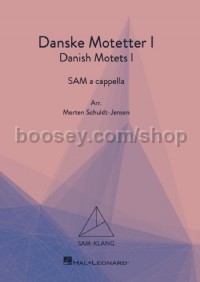Danske Motetter I/Danish Motets Vol. 1 (Choral Vocal Score)
Danske Motetter I/Danish Motets Vol. 1 (Choral Vocal Score)
Bulk Discounts Available
* Estimated price converted from UK retail price
This collection of six sacred works by the best-known Danish choral composers of the 19th and 20th centuries is a journey through 100 years of development in Danish choral music. Stylistically, the works span an arc from Niels W. Gade’s High Romanticism, through P.E. Lange-Müller’s late Romantic tonal language around the turn of the century, to two motets written only four years apart, in 1936 and 1940: one by Knud Jeppesen, whose polyphonic style is clearly inspired by his profound knowledge of Renaissance music; and the other by Bjørn Hjelmborg, who here combines a structural connection to early music with more of a contemporary and harmonically colourful writing style. We hear Romantic tones – perhaps surprisingly – in Thomas Laub’s sacred song from 1925, where we encounter a different, very personal side of the composer than that of the church music reformer who was to shape Danish liturgical music for a century.
The name SAM-Klang takes the three voice parts from the arrangements – Soprano, Alto and Men – and combines it with the Scandinavian and German words for ‘sound’ to create the portmanteau word ‘sound together’ or ‘harmony’. The SAM-Klang series offers basic and advanced choral repertoire arranged for soprano, alto and one male voice- part. In addition to new repertoire and new arrangements, you will also find essential parts of the classical German, Scandinavian, French and English SATB repertoire, carefully and considerately reworked for SAM. The arrangements retain the characteristic features of the original movements and have almost the same richness of timbre, resulting in works which sound nearly unchanged to an audience. Piano reductions of all choral movements facilitate rehearsal preparation. The arrangements offer development opportunities for all voice sections, bringing new life and new quality to SAM choir work. SAM-Klang enables youth choirs to gain access to classical choral literature and ensures that mixed choirs who face challenges in finding singers for all male voice parts continue to have access to well-loved repertoire.




